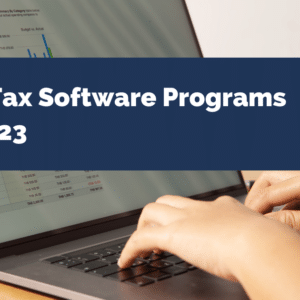Sleepless nights, panic attacks, and pounding headaches are feelings that are far too familiar for taxpayers during the spring. In fact, years ago, just the mention of the word taxes was enough to send my head swirling with numbers and a feeling of dread to creep its way into my stomach.
Thankfully, after hiring a tax professional, these days are far behind me. As with most things in life, taxes are not always so black and white but can be extremely complicated and dependent on each person’s unique financial situation.
While tax season is still far from the near future, I have learned that it is never too late to start preparing for your next tax return, and doing so in advance will save you not only money but, perhaps more importantly, time.
Table of Contents
Here is a list of my favorite tax preparation softwares to help you file your taxes:
Filing a tax return is not something you have to face alone and is oftentimes best handled by a tax professional, depending on your situation. This was a hard concept for me to grasp as I was convinced that even as I started a small business with my accounting degree, I could conquer the world of numbers and certainly not be defeated by taxes. I quickly learned just how false this was.
After hours of slaving over tax forms and scouring my house to find lost receipts and bills, with my confidence shattered, I accepted defeat and admitted that it was time to bring in a professional. Between recently purchasing a home for the first time and dealing with loans and multiple incomes, my taxes were simply too much to handle.
Don’t be fully discouraged from doing your own taxes, though, as the difficulty in everyone’s tax return is different. Here are some advantages and disadvantages to consider before hiring a tax professional:
Advantages
Filing Your Own Taxes Can Be Incredibly Time-Consuming
In 2022, the IRS estimated that the average person spent 24.2 hours completing their tax returns, a number that I had easily surpassed when attempting to handle my own taxes. For those who had to file a Schedule C for business or a Schedule E for rental properties, this number quickly jumped to 52.2 hours.
To put this number into perspective, if you assume that the average person’s time is worth $25 an hour, that is a cost of up to $1,305 dollars. Money and time that could be saved, invested, or, in my case, put towards the down payment on a new car. A tax professional will be able to work quickly and efficiently and save you not only time but a headache that is sure to follow.
Tax Preparation Fees Can Be Deductible
Assuming you itemize, any fees you incur while preparing for your taxes can be deducted on Form 1040 as long as the sum of your miscellaneous deductions you are claiming here is greater than 2% of your adjusted gross income.
Difficulty
Filing a tax return cannot only be complicated and confusing but is also constantly changing. The Federal tax code is adjusted each year, making it nearly impossible for the average taxpayer to be fully aware of all changes that may apply to them. If you must claim any of the following, as I had to, it is especially advised that you speak with a tax professional as these scenarios will instantly complicate your tax return:
- You own, sold, or started a business
- Have any investment losses or gains
- Capital asset transactions
- Real estate transactions
- Change in marital status
- Your income and residence are not in the same state or country
- Trust Fund Transactions
- Completing a Schedule for Self-Employment Income
Find Deductions or Credits That May Have Otherwise Been Missed
TurboTax is not bulletproof in finding every deduction and credit relevant to your situation. In fact, for taxpayers with complicated situations (mentioned above), it is recommended you use a professional tax preparer. Even the CEO of Intuit (the maker of TurboTax), Brad Smith, used an accountant for the last two years because he had transactions involving trusts and other complex activities to report. (1) Now, if even Brad Smith consults with a professional on taxes, there is no shame in any of us doing it. If you just have a W-2, children, mortgage interest, or simple tax situation, consider using the software.
Audit Assistance
In the unlikely event that you are audited, a tax professional (only a CPA, Enrolled Agent, or Tax Attorney) can work with you to organize any necessary paperwork and can deal with the IRS directly on your behalf, ensuring that you are well represented. Sometimes, using a tax professional who can represent you in front of the IRS and who also prepared your tax return can help streamline things with an audit.
Even though only 1% of taxpayers are audited each year, I certainly would still rather not take any chances and face the dreaded IRS alone.
Avoid Mistakes
Regardless of how confident you are in your ability to file your taxes, mistakes are inevitable. Many professional tax preparers use software as well, and they can double-check things themselves.
Convenience
This point speaks for itself, as there are few who can deny the appeal in avoiding the stress and hassle of filing taxes.
Disadvantages
Cost
Depending on the complexity of your tax return, the fee associated with hiring a professional can be overwhelming. The average cost for a tax professional is generally around $100 for a simple tax return, well over $200 dollars if you are itemizing, and more than $300 if you need to complete Form 1040 and Schedules A and D for capital gains and losses.
While these costs might not sound too unnerving, there is always a catch. And in this case, one that can end up costing you hundreds. In addition to hourly fees that you will often incur, the price can quickly rise based on the complexity and paperwork required by your return.
Even the state you file in can impact how much you pay. While those residing in the South will, on average, only pay around $150, those in larger cities in the North can be stuck with bills well over $750 (2), which is just another reason why I’m thankful I was drawn down south to the sun.
Tax Preparation Software
Computer programming software can often be a great alternative to hiring a tax professional and is in some cases, the better option (if your tax situation is not complex with many itemized deductions and abnormal transactions). Tax preparation software is often inexpensive and can guide you through filing your tax return in the same way a professional would, especially if your tax return is not complex.
Here are some of the most popular:
- TaxAct – You can read my full TaxAct review here.
- H&R Block – You can read my full H&R Block review here.
- TurboTax – You can read my full TurboTax review here.
Inadequate or Unqualified Professionals
Some say a big drawback of the IRS regulations is that CPAs and tax attorneys who prepare for the 1040s do not have to pass a taxation competency exam and mandatory continuing education (with regard to taxation).
When choosing a tax preparer to do a tax return for you, it is important to make sure they are registered with the IRS and have years of experience in preparing tax returns. In 2008, the Council of Better Business Bureaus reported that complaints about tax preparers increased by an astounding 80% within five years, a discouraging number, especially when considering the highly personal information they are trusted with.
Be aware of large companies in the future as well because the new IRS requirements and exams only apply to tax preparers who sign the tax return (which means that the tax preparation can be done by someone other than the certified tax preparer signing the return).
Must Plan Ahead
It should come as no surprise that tax professional’s busiest time of the year is in the spring. That being said, finding a professional who is willing to consult with a new client in February or later is challenging – take it from me: I also made the mistake of trying to find someone to help me late in the game. If you do decide to work with a tax professional, you should start preparing for the upcoming tax season and speak with a professional in the fall.
Overall, there is no clear-cut answer to whether or not you should hire a tax professional. If you have not made any significant changes in the past year or have a simple tax return, you should consider tackling your taxes on your own or using tax preparation software.
However, if your taxes are complex, you may be better off swallowing your pride, saving your sanity, and joining me and the other 60% of Americans who hire a professional each year(3). If you decide to go the tax professional route, make sure they are registered with the IRS (have a Preparer Tax Identification Number), have at least 5 years of experience at minimum, and have contactable and reliable references.
This guest post article was provided by TaxDebtHelp.com, a site that offers IRS tax debt help through informational articles, guidelines, and services for major tax problems such as unfiled taxes, tax levies, tax liens, major tax penalties, and more. TaxDebtHelp.com is not endorsed or affiliated with LPL Financial.
The Pros and Cons of Hiring a Professional Tax Preparer
| PROS | CONS |
|---|---|
| Filing Your Own Taxes Can Be Incredibly Time-Consuming | Cost (Can Be Expensive) |
| Tax Preparation Fees Can Be Deductible | Tax Preparation Software Might Be a Suitable and Cheaper Option |
| Addresses the Difficulty and Complexity of Changing Tax Codes | Risk of Inadequate or Unqualified Professionals |
| Ensures You Find All Relevant Deductions or Credits | Must Plan Ahead, Especially During Peak Tax Season |
| Offers Audit Assistance | |
| Reduces Likelihood of Mistakes | |
| Convenience and Stress Reduction |
The Bottom Line – The Pros and Cons of Hiring a Professional Tax Preparer
Tax season can be a daunting period for many, filled with complications and anxiety. Deciding between hiring a professional tax preparer and going it alone hinges on individual financial situations, time, and willingness to navigate tax intricacies.
While professionals can offer expertise, time-saving benefits, and audit assistance, they come at a cost, and there’s the challenge of vetting their qualifications.
Conversely, tax software provides an alternative for simpler tax scenarios, though it isn’t foolproof. In essence, a considered approach is essential.
Evaluate your financial complexity, weigh the pros and cons, and choose the option that best safeguards your peace of mind and financial interests.
Sources:







